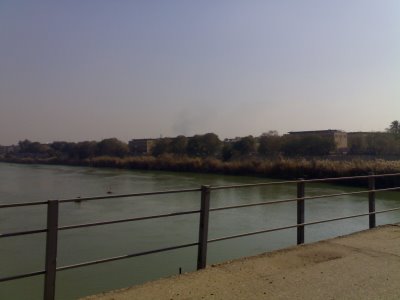Last week there was an incident in which a private security company killed 8 and wounded 13 civilians on the streets of Baghdad. The convoy was returning to the green zone when a bomb or rocket went off close by, and the security personnel opened fire on the street. This was by no means the first such incident - there have been many of these. The company concerned was Blackwater, a US based company. The Iraqi authorities have reacted by saying enough is enough and it will expel Blackwater and its employees from Iraq, as well as prosecuting the individuals involved. Blackwater is a huge company and has the contract to provide protection to US State department personnel, including the US Ambassador, in all movements outside the green zone. Its expulsion would be a significant problem for the US if it happens.
I think it would serve them right. Blackwater has long been the company that likes to think it can operate above the law. I would estimate no less than 70% of the incidents involving a private security company killing or wounding civilians on the streets of Baghdad have been Blackwater. They didn't even bother to get a licence until a few months ago. The company has ties to the Republican party and basically has patronage from the US government which might explain why it thinks its above the system. The actions of Blackwater have always cast a shadow over the entire private security industry in Iraq. The vast majority of companies do operate professionally and are not the trigger happy mercenaries the media like to portray. Unfortunately, this latest incident will likely lead to a review by the Iraq authorities of all companies' licences, so it might well be that some other companies get kicked out even if they have operated with restraint and professionalism, and within the law.
It remains to be seen whether Blackwater really will get kicked out. Condoleeza Rice has personally intervened to try and stop this from happening. The importance of this can't be made clear enough - this is a real litmus test of how independent the Iraqi government really is from the US administration. Everyone in Baghdad knows that Blackwater is by far the worst offender and that it has always operated above the law. Whether the Iraqis go ahead and expel the company will be one of the clearest signs yet of whether they are really able to dictate their own policies independently of US wishes.
Part of the problem is the Iraqis' own making though. They were supposed to pass a law to regulate the private security industry but have failed to do so. I saw a draft law several months ago and it was a shambles. It conflicted with other laws and had inconsistencies in itself, and was going to be a total failure if it became law. I warned of this in an address to an audience with many members of PSCs and Iraqi officials from the Ministry of Interior, which is the government agency responsible for overseeing the industry. That was months ago, and we still haven't seen a next draft. The sooner they pass a law that works, the sooner they will be able to regulate the industry properly and get rid of companies without having to wait for incidents like the one last week.
Another issue at work is self interest of government ministers and people connected with the Ministry of Interior. In the last 12 months around 6 or 7 foreign PSCs have been issued with a licence from the Ministry of Interior, against about 20 odd Iraqi PSCs. The Iraq companies are all owned by government ministers and people in the Ministry of Interior. Clearly, they're trying to freeze out the foreign companies so that the contracts all go to the Iraqi companies. Aside from the corruption of this, it will spell disaster for the performance of those contracts. But hey, it's their country and we weren't invited so I can't honestly say we can claim any moral high ground. It's just a shame that the companies who do a good job protecting reconstruction contractors, NGOs, Iraqi officials and others could be sidelined despite doing a good job under difficult circumstances. There are many of you who read this and say "well they're only mercenaries anyway" but that's simplistic and ignores the reality not portrayed in the media. Guys like Blackwater behave like mercenaries, not the industry as a whole.
And, I should add, the vast majority of employees working for most of the companies in the industry are Iraqi. There are many foreigners, but mostly it's Iraqis doing the job. That's probably something else the newspapers don't mention.
Ushuaia Dec 10 - 14
17 years ago
















